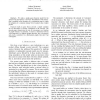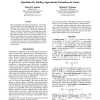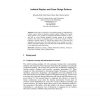909 search results - page 31 / 182 » Games for extracting randomness |
APAL
2008
13 years 7 months ago
2008
We show that for random bit strings, Up(n), with probability, p = 1 2 , the firstorder quantifier depth D(Up(n)) needed to distinguish non-isomorphic structures is (lg lg n), with...
CIE
2010
Springer
13 years 11 months ago
2010
Springer
In the theory of algorithmic randomness, one of the central notions is that of computable randomness. An infinite binary sequence X is computably random if no recursive martingale...
FOCS
2009
IEEE
14 years 2 months ago
2009
IEEE
— We study a simple game theoretic model for the spread of an innovation in a network. The diffusion of the innovation is modeled as the dynamics of a coordination game in which ...
AAAI
2010
13 years 7 months ago
2010
Many computational problems in game theory, such as finding Nash equilibria, are algorithmically hard to solve. This limitation forces analysts to limit attention to restricted su...
ECTEL
2010
Springer
13 years 7 months ago
2010
Springer
In this paper we describe a social learning game we implemented to evaluate various means of ubiquitous learning support. Making use of game design patterns it was possible to impl...



